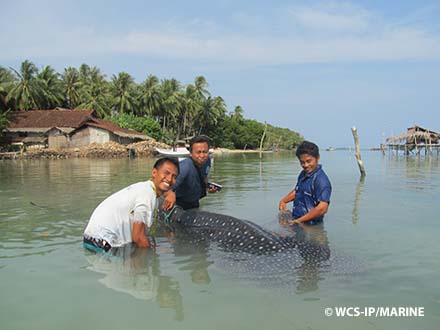
By: Efin Muttaqin
An encouraging come back
While catching anchovies and small bait fish in a stationary net off the coast of Java on October 8th, a group of fishers discovered a much larger animal in their lift net—a juvenile whale shark measuring 4 meters in length (12 feet). Whale sharks have not been common in these waters over the past decade, so the appearance of this animal in a coastal net was asurprise to the fishers.
SMS messages that can save wildlife
The fishers quickly alerted the Karimunjawa National Park Authority and WCS staff usinga text message system (SMS) established for reporting fishing violations, and the animal was released.
With training from WCS and RARE, another conservation organization, fishers now use the SMS “hotline” to report fishing violations and marine animal strandings to park authorities instantaneously.
Using ‘texts’ to respond to fishing violations and strandings has greatly increased the efficiency of regulatory enforcement in Karimunjawa, and this low-cost system is helping to bring ecological balance back to the coastal waters of Karimunjawa while boosting fishing productivity as well.
Ecological recovery?
The presence of the shark may indicate the ecological recovery of Karimunjawa waters due to changes in fishing regulations. Over the past 3 years, a series of no-take reserves have been established, as well as a total ban on destructive trawl nets that destroy seabed habitat in coastal areas, both of which have ledto a boost in local fishery production.
A 50% increase in local fish populations over the past 3 years
The new SMS system has also led to the prosecution of illegal trawl fishing by the park authority, that has previously decimated local fish populations. Data from WCS and government agencies now show a 50% increase in local fish populations over the past 3 years (to 2013), which in turn is bringing whalesharks back into the area most likely due to the increase in prey (e.g. plankton, small fish and fish eggs).
With support from the national park authority, WCS continues to conduct research and monitoring of local fisheries which can shed light on causes of whale shark occurrence in Karimunjawa National Park.